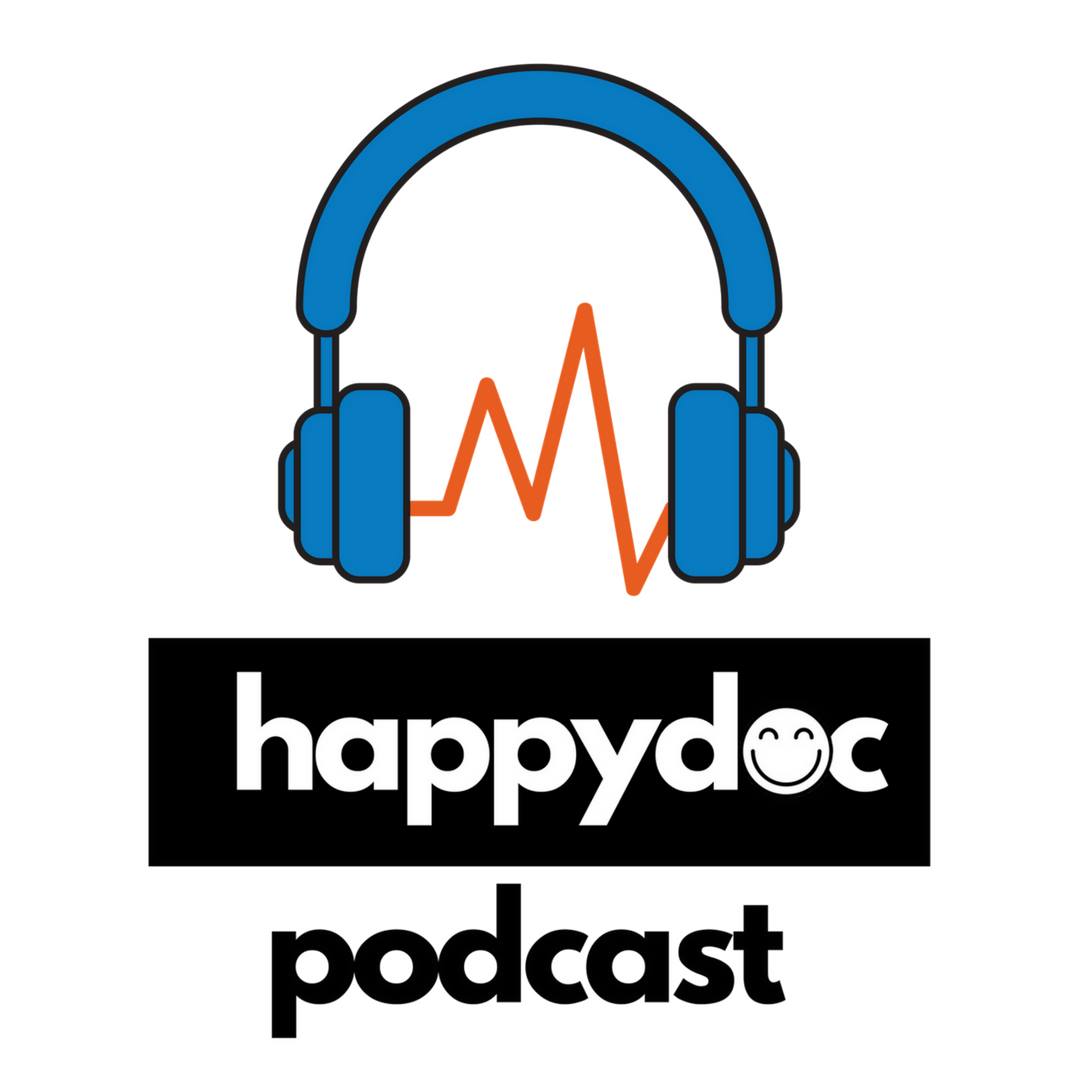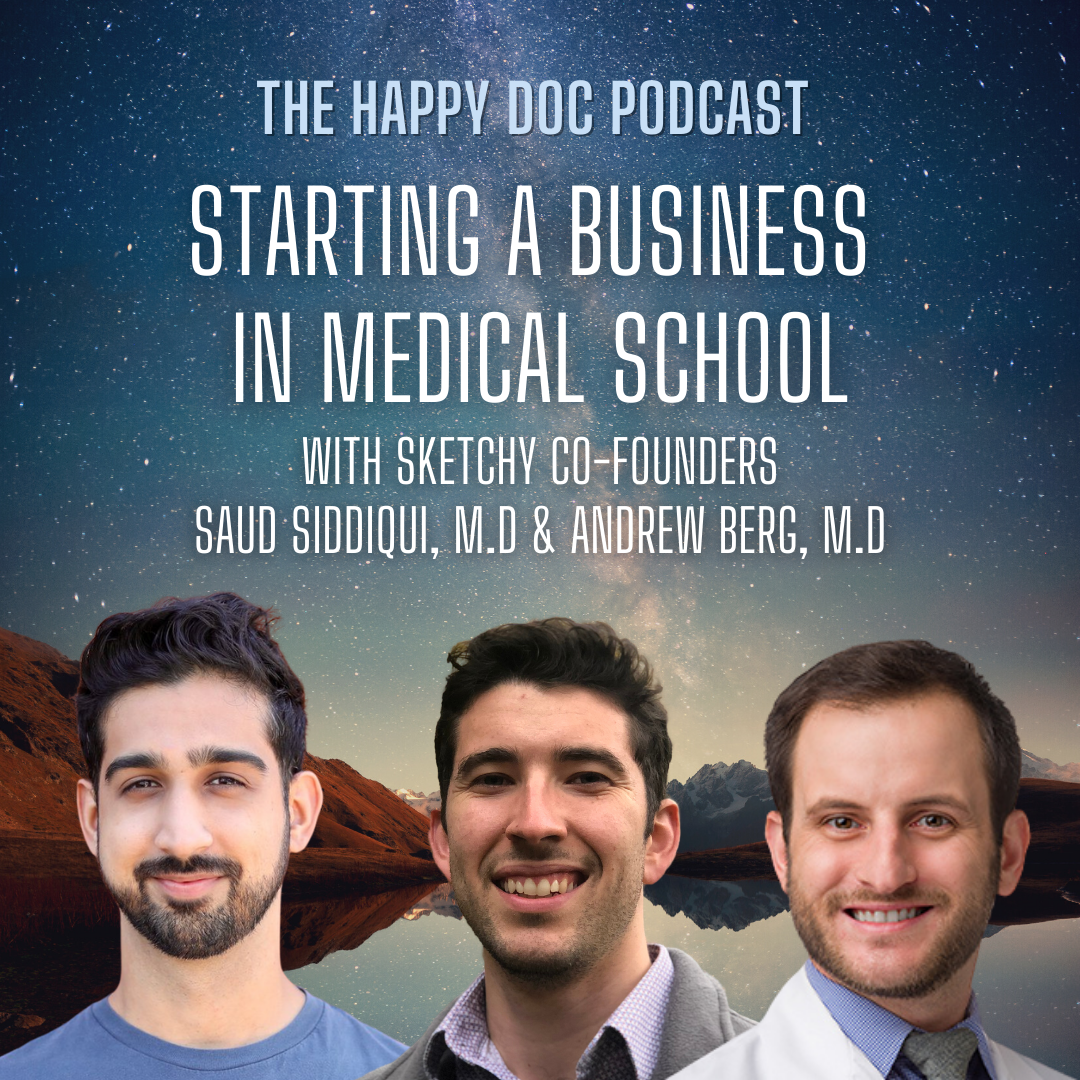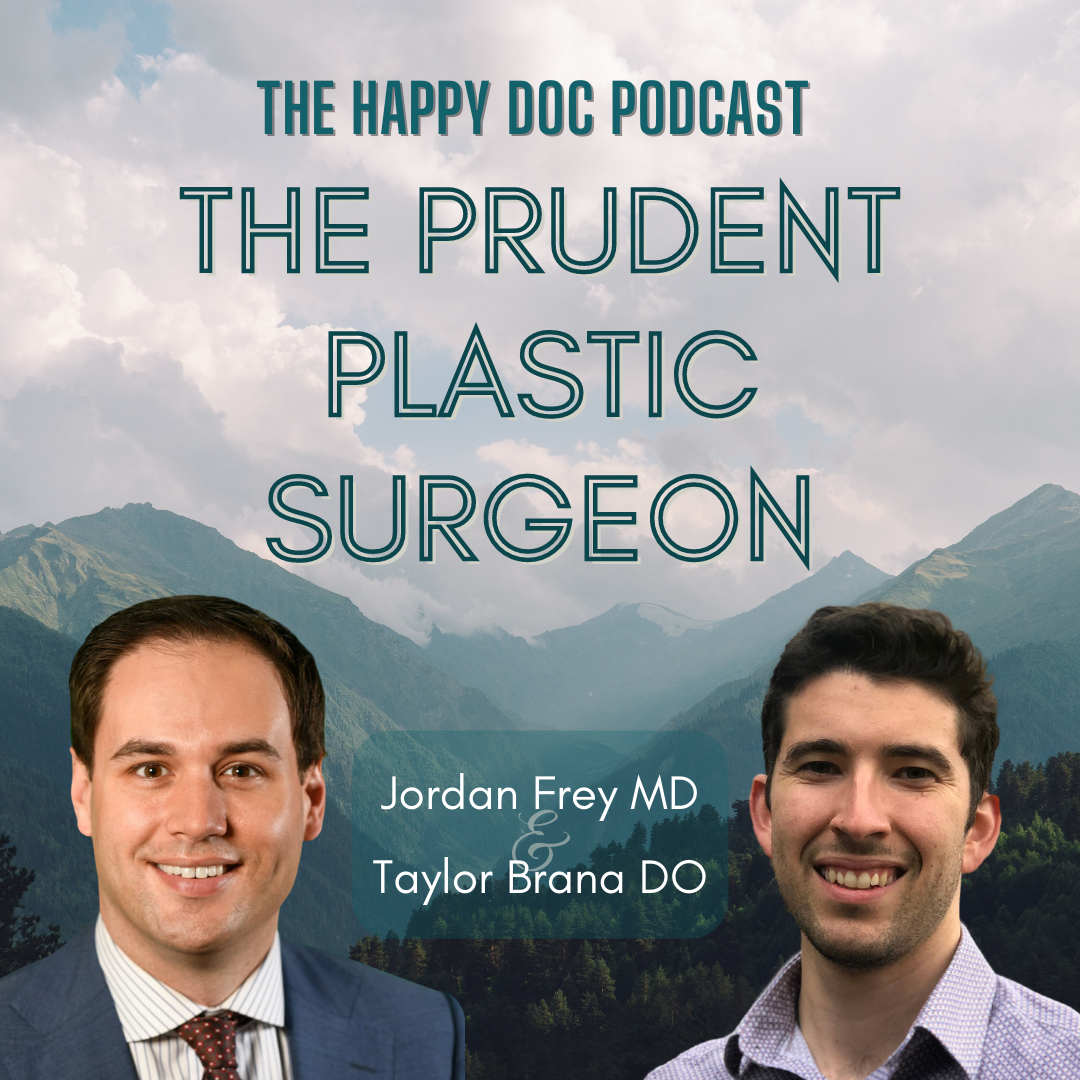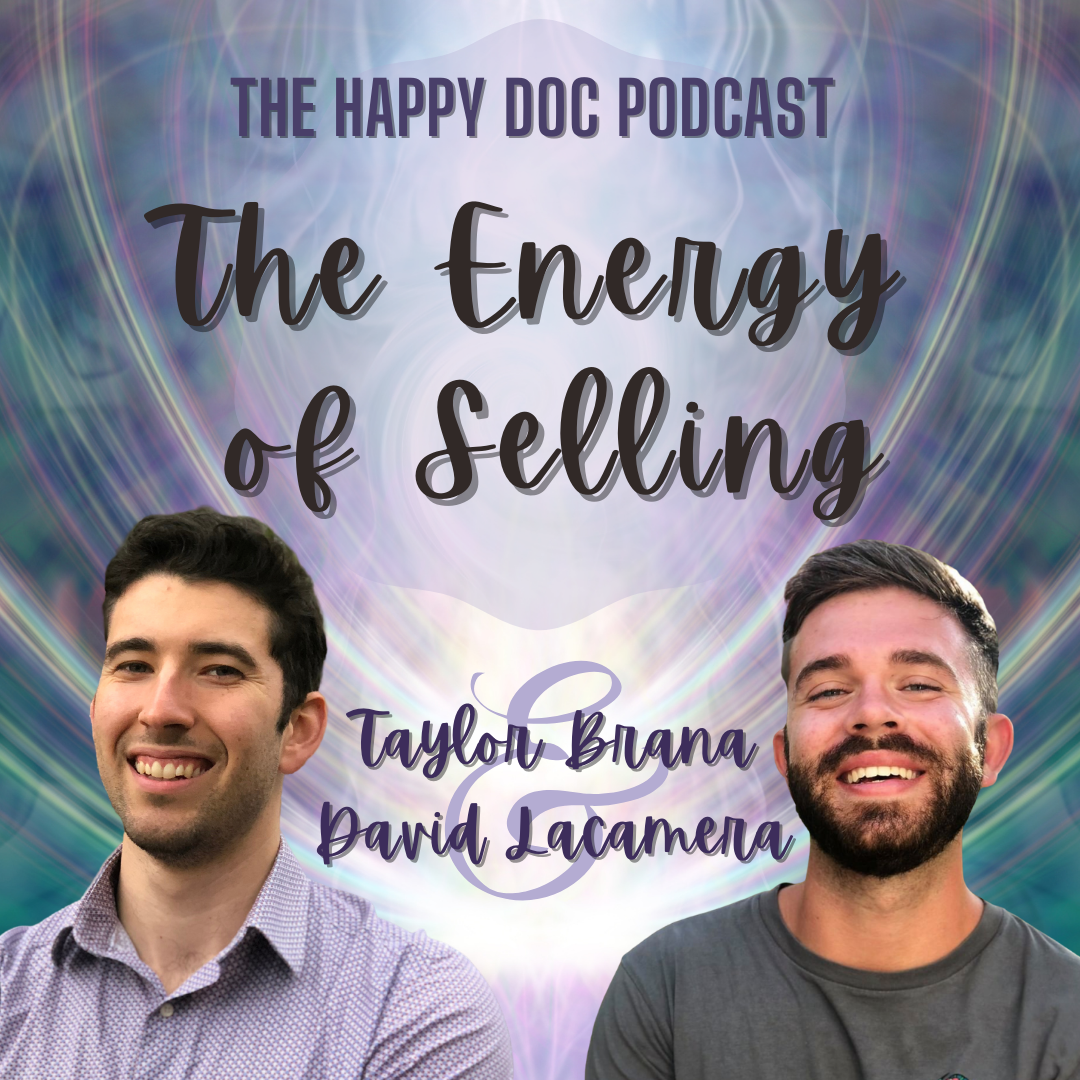In this very special episode of The Happy Doc, Taylor…

Top Takeaways From Residency and Entrepreneurship with Dr. Neel Desai
In episode 238, Taylor speaks to his business partner, Family Physician Dr. Neel Desai. Reflecting on finishing his third year of residency, he shares tips for interns, second, and third year residents. They discuss the changing landscape of what it means to be a doctor in 2020, and why creating your own path can ultimately lead to fulfillment.
When you have a lot of chaos out in the external world, that can make you feel chaotic inside. We have to create structure for ourselves.
Dr. Taylor Brana
Taylor’s Takeaways
On stress and anxiety in this uncertain world:
We have to create structure for ourselves. And there’s two ways to structure things.
I have a preference in the way I do it. If you want to maintain discipline, one way to be structured is to literally plan your calendar. Meticulously. I wake up at eight every morning. I do this, this, and this every day, I’m going to get this accomplished and this accomplished. So one route, one tip, is to plan ahead and to create structured routines, regardless of what’s happening out in the world. So for example, that would be, I’m gonna exercise 10 minutes in the morning. I’m going to prepare my breakfast the night before. I’m going to go on a walk. I’m going to meditate for 10 minutes. I’m going to journal for X, Y, Z amount of time.
Those are all ways to create that structure. I’m going to have a nighttime routine. So creating those routines and those structures in place are super important to do that.
Also, why the heck are you organizing yourself in the first place? You have to have something that you’re passionate about, a creative project, a thing that you’ve always wanted to try, a book you wanted to read, a movie, you wanted to watch, an instrument you wanted to play. You have to have something to look forward to when all of that crap is happening. And so when you have all that set up, then everything works out. So one thing is to create that structure, right? So I gave one idea, which is this disciplined structure to create organization out of the world of chaos.
The second way, which I prefer to do because it’s actually hard for me to be as disciplined and motivated, is I literally just have a whiteboard of Goals of the Day. It doesn’t matter when I complete it, but I do have to complete it. So, I personally like to get into what I call the positive action flow, where I take care of a few good things in the morning.
And if you take care of a few things in the morning, like tasks, it’s a lot easier to start to get through the day. On top of that is something that I really like to talk about. Tony Robbins is the one who originated this concept. It’s called State Story Strategy. And the main concept is, the day looks a lot harder when you’re in a negative mindset, right?
So, if you start your day with something that increases your State, meaning, maybe you’re exercising in the morning, maybe you listen to music that gets you excited. If you read a passage or something that’s going to be inspirational. If you listen to a podcast that gets you pumped. If you increase your state, everything looks better.
You have more options in the day. If you don’t have a positive mindset and you come in, you wake up in the morning, groggy, you feel depressed. You’re just not going to operate in a way that’s going to be effective. So if you can think of a way to improve your state, maybe the chaos in the world won’t have as much of an effect.
See: The 3 Steps to a Breakthrough by Tony Robbins
We’re going through a collective grief process, because we’ve lost a lot of things, time, and experiences.
Dr. Neel Desai, re: living through the COVID-19 pandemic
On First Year of Residency:
You know, with this changing world, obviously there’s a lot of things that are different, but I would say that, things that are salient for an intern year, like step number one is you don’t know anything.
You know what it’s like from a medical student perspective, but you will be handling a new level of responsibility, listen to your preceptors, listen to your attendings, listen to your senior residents and just be a sponge. The big thing is don’t have a big ego. Ask lots of questions if you’re not sure.
Ask early, and ask often and it’s okay to be a little bit “annoying” at first. Obviously, you do have knowledge that is effective, but the big thing about being an intern is you’re still at a state where you don’t really know what you don’t know. You’re still early in your career. You haven’t seen enough cases for your set of your specialty, or whatever it is that you’re doing.
So you need to just immerse yourself and ask lots of questions. Why did the attending or the senior and make the decisions they made? Understand the underlying reasons. If there’s a case or something you don’t understand, use the resources, you know, use, you know, whatever textbook you’re using, go on UpToDate, go onto these different websites, go to Medscape, read whatever you need to do to understand what’s actually happening.
You’re creating your database. No one is expecting you to be perfect, but they are expecting you to show up and to learn. So, intern year is really just about this consistent, and again, persistent behavior, to just constantly learn. Don’t beat yourself up. We all make mistakes. And it’s all about improvement over time.
The worst thing you can do is to lie about what you saw or, or not ask questions when you don’t know something, because if you’re lying, obviously that’s terrible. You’re going to hurt the patient. You’re going to hurt the team, and that’s never going to help. So be honest and number two is to ask lots of questions, because if you’re not, you’re doing yourself a disservice in the longterm.
On Second Year of Residency:
As a second year, you start to know lots of stuff. But you’re still – ideally speaking, you know enough in second year to know that you don’t know certain things. So now you’ve kind of captured the broad amount of things that you’re probably going to see.
And then I would, I often, and I literally just had this conversation with someone who’s in second year. I was like, you’ve probably seen like 90-ish percent of the things you’re probably going to see commonly, there’s probably 5-10% you probably haven’t seen, and you need to identify what you haven’t seen yet and be aware of what you haven’t seen and be able to start to notice when that’s happening.
So when it does, you can talk to your seniors, you can talk to the attendings. No one is going to beat you up. You know, you’re probably going to get a little beat up if you can’t do the common things at this point. But no, one’s going to get mad at you if you can’t do the uncommon things, but you need to be able at this point to most likely identify the uncommon things and then ask questions about the uncommon things.
On Third Year of Residency:
As a third year, I would say the big thing now is you’re a senior, you know, you’re, a junior attending, basically at this point. You are starting to deal with more complex thinking. I noticed when I’m talking to attendings now, it’s not like someone’s right and someone’s wrong. It’s more about having that complex sort of conversation. So now you’re, ideally speaking, you’re at a level where you’re going to have that more complex thinking.
The other thing I’d start to do as a third year is start to think about what you actually want to do in the future. Start to think about what your career looks like. And I’m not just talking about your medical career, but also your life.
Where do you want to live? What’d your finances want to look like, what does your future schedule want to look like? What sort of things might you want to do in the future? And there’s so many things like there’re so many options out there, the way your lifestyle looks like. So don’t limit yourself to what everyone else is telling you.
Open your mind to the possibility that you can be, possibly, entrepreneurial. You can do something creative. You can start a podcast, you can learn a different instrument. You can live on the west coast, or you can live on an island. You can live in the North. You can live in the South. Open up your mind to different possibilities.
Also learning things like negotiating contracts, understanding disability insurance, understanding 401(k), Roth IRA and finances, understanding how much your salary really does for you and what it really might not do for you. Cause a lot of people, you know, and I’m learning this too, is when you become an attending, you think you have a lot of money, but you’ve been postponing your loans, most likely.
So, I would say there’s a lot of life things that also need to start to be worked through. And, I know we’ve been delayed for a long time, but you still gotta, you still gotta live frugally and think about those decisions. So, as a third year, I think you, you know, as you get more comfortable in the medicine stuff, you can start to think about what that future looks like.
For some people that’s taking that fellowship for some people that’s going straight through and getting a job. For some people, it might be, you know, I’m going to take a six month break. So you just have to, you have to think about what those things are. So, those are some like general things I would think about.
The biggest things that make people happy, from a productivity standpoint, are doing what you love and doing something you’re good at. If you know yourself well enough, eventually you’re going to know what you’re good at, and you’re going to know what you enjoy doing. If you do both of those things, you will be successful.
Dr. Taylor Brana
Episode References:
- “Triage Your Life” is from our 8th episode with Dr. Amy Faith Ho. See our show notes and listen to the episode here
- “State, Story, Strategy” is from Tony Robbins’ Three Steps to a Breakthough
- David Goggins’ “Cookie Jar Method“
- The “10 C’s of Medicine” by Dr. Neel Desai
- The Key to Achieving Goals: Consistent, Persistent Pursuit by David Meltzer
Thank you for reading! The full transcript is below. If you enjoyed this episode and the topics referenced, please give us a five star review on iTunes, leave a comment, and share with your friends.
Transcript available on page two.
1 2




This Post Has 0 Comments